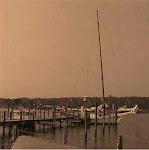Albert Poe
Albert Poe knew best where to lay his traps on St. George Island for meat and skins. He knew where the crabs were in the summer and oysters in the winter. He knew when and where he could dig a mess of piss clams, if anyone should want them.
He knew when the fish were in and where they would school. He saw the first osprey arrive every year and the first martin. He knew the day their young ones flew and the day they left.
He knew when it would rain to harm a day’s work and when it would only hinder.
He read the newspaper aloud in the island’s store. He explained to his neighbors what came above their scrawled legal signatures.
He died in the state mental institute. Vitamin deficiencies, his daughter said with a shrug.
A framed, black and white photograph of Albert Poe, skinning something spread across newspaper upon a kitchen table, sits on my husband’s dresser. He is an older man in the photograph. Not too old. He is smiling a small, nice smile. He looks nice.
His daughter called him Daddy to her last breath. Her youngest son is his embodiment. So goes the talk. So grows the legend.
Jackie Russell
Legends were easily made on the Chesapeake Bay, filled, as it was, with lone fishermen upon emptying seas. Watermen are the last true hunters of the continent. Those few remaining were sons of women who in the 1960s still ordered chicks through the Sears & Roebuck Catalogue to hatch the egg money that ran their households between seasons.
When their mothers were girls, at least on the Chesapeake’s islands, laundry was carried by boat to the nearest mainland high enough above sea level for hand-dug wells to reach freshwater.
In the early 1980s Chesapeake Bay watermen still made plentiful livings from a diminishing wilderness. Cash bulged in their pockets. They were weathered, muscled and independent. If they’d kept up their dental work they made for attractive legends. They still held unquestioned dominion over the water and the shore. They were wily but direct and somehow trustworthy despite the air of piracy that clung a bit to them all.
Their sudden standing in a legislative hearing, their rolling stride up a center aisle quieted the room. One alone could fill a bar with the nearly sexual smell of oily fish and ammonia.
Jackie Russell was the living embodiment of it all. He claims an island lineage from the English no-goods and stow-a-ways traveling beneath the decks of the Catholics who in the early 1600s sailed to the Calvert’s Merrye Lande of tolerance. He makes the claim, and plenty of others, with still a piece of an accent of that long-ago England.
It was mightily picturesque in the waning of 1983 to stumble upon a living legend. It was, in fact, irresistible. And it has dominated everything since.
“I’ve never met a man so popular,” a client gushed 20 years later, trying to charm me into a better cruising rate. “For all the places I’ve traveled and people I’ve known, I tell you, I’ve never met anyone, not anyone, there’s just no one more popular.”
“Yeah,” I tell him, “I know.”
Subscribe to:
Post Comments (Atom)

No comments:
Post a Comment